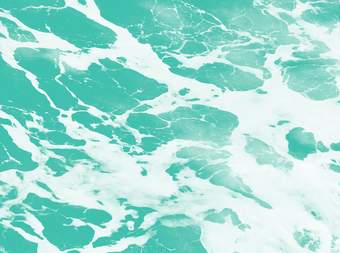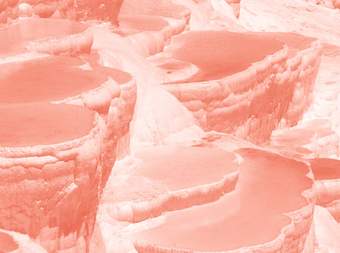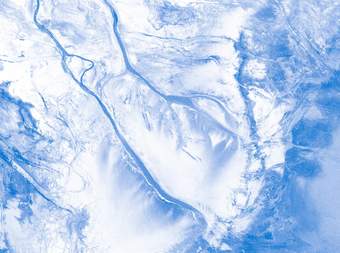Please join us in the Starr Cinema for the first day of Waterways: Arteries, Rhythms and Kinship, featuring film screenings, panels and a live performance.
This event is organised by Hyundai Tate Research Centre: Transnational.
14.00 Introduction
14.15 Lisa Reihana: GROUNDLOOP, 2022, 22min
Film screening
Commissioned by the Art Gallery of New South Wales, GROUNDLOOP by Lisa Reihana is a multiverse that charts voyages across Te Tai-o-Rēhua (Tasman Sea) and moments of connection between Māori and First Nations people. It imagines a future grounded in Indigenous technologies, cultural knowledge, kinship and care for lands and waters.
14.45 Break
15.00 The Imaginative Lens: Shaping new futures from Ancestral grounding
Panel
This panel considers the way in which we renew histories, regenerate cultural practices and connect through water kinships. Through their film and photography works Lisa Reihana, Lisandro Suriel and Christina Peake share future imaginaries and spiritual ecologies beyond the colonial narrative to form re-spirited spaces of agency and self-determined storytelling.
16.30 Break
16.45 Colonial Arteries: Surfacing submerged histories
Panel
Waterways have acted as paths of colonisation and disruption, but they also hold deep cultural significance to many people and are cleansing and healing. The panel examines water as a technology of colonialism and imperialism, from Dutch and British canals to rivers tied to colonial expeditions and capitalist expansion and to the catastrophic effects of British irrigation schemes in Sudan. The panel gathers Chandra Frank, Julie Gough, Ola Hassanain and Sonia Levy to explore ideas of displacement, healing, conversing with water and uncovering submerged histories and lifeforms.
18.15 Break
19.00 Adham Faramawy: Daughters of the River; In his Oozy Bed
Lecture performance
In this reimagined lecture performance for Tate Modern’s Starr Cinema, Adham Faramawy combines film, sound, and spoken word to tell the stories of the romances and toxicities of rivers and waterways. Drawing from Alexander Pope’s poem ‘Windsor-Forest,’ the lecture performance flows between poetic and narrative forms to explore these aqueous ecosystems. From the Thames at the museum’s doorstep, to the Nile River in Egypt, Faramawy explores the fragile boundary between purity and impurity, tracing the imperial histories of major waterways that sustain life for millions. Weaving history, mythology, fiction, and queer desire to the reveal the colonial undercurrents of rivers, Faramawy identifies them as sites of extraction and ecological collapse.
Participants
Adham Faramawy works across media including moving image, sculptural installation, performance, print, painting and wall-based works engaging concerns with materiality, touch, and toxic embodiment to question ideas of the natural in relation to marginalised communities.
They have had screenings at the Guggenheim Museum, New York; Tate Modern and Tate Britain, London; Serpentine Gallery, London and Serpentine Ecologies Symposia, London. They have had recent exhibitions at Goldsmiths Centre for Contemporary Arts, London (group), Somerset House, London (group), Buffalo University Gallery, Buffalo (group); the Bemis Center, Omaha (group); Niru Ratnam Gallery, London (solo), Chapter Gallery, Cardiff (solo), Focal Point, Southend (solo), and Cell Projects, London (solo). They were shortlisted for the Film London Jarman Award 2021 and 2017 and was the recipient of the Frieze London Artist Award 2023.
Chandra Frank is an Assistant Professor of Women’s, Gender, and Sexuality Studies at the University of Cincinnati. She is the 2024-2027 Taft Professor of the Public Humanities and will be working on collaborative and multi-modal methodologies related to art, ecology and public histories. Her interdisciplinary research focuses on feminist and queer of movement work, possibilities of dissent, and the ways in which race and the environment work as terrains of power. She is completing her first monograph in progress, Tidal Politics: Feminist Queer Diaspora & Refusal in the Netherlands, which charts the creative and strategic interruptions of feminist queer of color movement work in the 1980s alongside the literal and figurative sinking landscape and racial climate of the Netherlands. Over the last decade, she has been active as an independent curator working across continents and with various institutions such as the Bonnefanten Museum, Cincinnati Contemporary Art Center, 198 Gallery, and District Six Museum.
Christina Peake is a British Bajan collaborative practice-based doctoral researcher with the University of Westminster and The National Archives, whose research practice explores historic narratives of climate colonialism and extractivism in the Caribbean and how these can inform ecological and cultural interventions today. Peake blends research within collections, communities and environments, using immersive methodologies to inform the storytelling of complex speculative worlds, inclusive of their histories and futures.
Julie Gough is an artist, writer and curator, First People’s Art and Culture, at the Tasmanian Museum and Art Gallery (TMAG), Australia. Gough’s multi-media art works reveal and re-present conflicting and subsumed histories, legacies and impacts of colonization, sometimes referring to her family’s experiences as Tasmanian Aboriginal people. Gough has exhibited in more than 200 exhibitions in Australia since 1994, including Shadow Spirit (2023), Biennale of Sydney (2022, 2006), Tarnanthi (2021, 2017), Adelaide Biennial (2018, 1998), Eucalyptusdom, Tense Past, Defying Empire, The National , With Secrecy and Despatch, Undisclosed; Clemenger Award, Liverpool Biennial, UK (2001), Perspecta (1995).
Lisa Reihana Ngāpuhi, Ngāti Tūteauru, Ngati Hine, Ngāi Tūpoto (b.1964, Aotearoa, New Zealand) is a multi-disciplinary artist whose practice incorporates the lens based arts, sculpture, public artworks and costume. Since the 1990’s she has significantly influenced the development of contemporary art and contemporary Māori art in Aotearoa New Zealand. Her ability to harness and manipulate seductively high production values is often expressed through video and portraiture where she explores how identity and history are represented, and the intersection of these ideas with concepts of place. Reihana employs a philosophy of ‘making’ rather than 'taking’. In 2017 she represented Aotearoa New Zealand at the Venice Biennale with in Pursuit of Venus [infected] an artwork exploring early English contact with the South Pacific.
Lisandro Suriel is a photographer born and raised in the Caribbean, in Saint Martin. He also specialized in directing and producing visual concepts for film and photographic production. He currently lives in Rotterdam. He earned his Bachelor's degree in Photography at the Royal Academy of Art in The Hague and received his Master's degree in Artistic Research at the University of Amsterdam. Lisandro Suriel's work has been published worldwide and featured in numerous exhibitions, most recently at Photo Basel and the 6th edition of Photo Vogue Festival Reframing history in Milan where he was the recipient of the Photo Vogue / Studio RM Prize. In 2021, he was selected by FOAM magazine's Talent issue as one of 20 outstanding photographers and featured his artwork Black Magic in a digital exhibition. In 2022, Foreign Agent presented the Jumbee Sea, Lisandro Suriel's first solo exhibition at the gallery. Through his work, he seeks to disengage the Black narratives from a one-dimensional colonial history, solely based on exploitation and slavery. According to him, an essential part of his history and identity is found in immateriality which he calls the Black Imagination. Therefore, Suriel explores oral traditional stories and the Black subconscious as a means of reconfiguring collective memory and reclaiming history.
Ola Hassanain leads a critical spatial practice as a visual Artist with architecture training. Ola premises her work on an idea of “space as political discourse" an expanded notion of space, that tries to develop spatial literacy which can aid us to imagine different political ecologies. Ola's development of critical spatial practice is partly informed by her post-academic training; a current teaching role at KABK Royal academy of Art in the Hague, a Rijksakademie residency 2021-2023, BAK basis voor kunst fellowship 2017-2018, main tutor and co-development of the Blackerblackness Master course Sandberg Instituut 2021- 2023, teaching ‘Art in Context’ at HKU University of the Arts Utrecht at the Fine Art Department. Ola’s work was exhibited in a Solo at Buro Stedelijk 2024, Hartwig Art Foundation commission showing at Casco Art Institute 2021, Ghana Contemporary Art Foundation 2023, Chicago Architecture Biennial 2019 and Sharjah Architecture Triennale 2019.
Conveners
Kimberley Moulton is a Yorta Yorta woman who lives and works on Wurundjeri/ Boonwurrung lands, Melbourne, and London, England. She is Adjunct Curator, First Nations and Indigenous Art at Tate Modern and Senior Curator at RISING, Melbourne’s international arts festival. Moulton was previously Senior Curator, First Peoples Collection at Museums Victoria (2016-2023). She works with knowledge, histories and futures at the intersection of historical collections and contemporary art. Her practice works to rethink global art histories and extend what exhibitions and research in and out of institutions can be for First Peoples communities and artists more broadly. She is currently a PhD candidate in curatorial practice with the Wominjeka Djeembana Indigeneous Research Lab Monash University. Her board roles include Deputy Chair of the Board Shepparton Art Museum and member of the Board for the Adam Briggs Foundation. In 2025 Kimberley is curating the Tarrawarra Biennale.
Marleen Boschen, is a curator, lecturer and artist working at the intersections of art and ecology. She is Adjunct Curator of Art and Ecology at the Hyundai Tate Research Centre: Transnational. She is also a post-doctoral fellow at the Royal Botanic Gardens, Kew with the research project Future Ecologies of Art, which examines botanical organisations as sites of artistic engagement. Since January 2023 she has co-curated Testing Grounds / Seeding Worlds, an artistic programme on cultivation, migration and agroecological learning for the garden of Villa Romana, Florence, with Elena Agudio. Her current research explores border ecologies, sonic practices, and ecological imaginaries.
Nabila Abdel Nabi is Senior Curator, International Art, Tate Modern. She joined Tate Modern in April 2019 as Curator, International Art, and has been embedded in the centre's core activities, as well as being responsible for organising exhibitions and displays, developing the museum’s acquisitions strategy and broadening the representation of artists from West Asia and North Africa. She has worked on exhibitions including Hilma af Klint & Piet Mondrian: Forms of Life, The Making of Rodin, as well as major collection displays of Anna Boghiguian, Farah Al Qasimi, Huguette Caland, Akram Zaatari, Yto Barrada, Wael Shawky, and Infinite Geometry. She was previously Associate Curator at The Power Plant, Toronto where she worked on solo exhibitions and facilitated new commissions by artists including Hajra Waheed, Abbas Akhavan, Kapwani Kiwanga, Kader Attia, Latifa Echakhch, Vivian Suter, Karla Black, Omar Ba and Amalia Pica, among others. Abdel Nabi has edited and contributed to multiple exhibition catalogues and publications. She has presented her work and been a guest lecturer at institutions including University of Cambridge, Courtauld Insitute of Art, SOAS University, amongst others. She holds degrees from the Courtauld Institute of Art and University of Chicago.
Odessa Warren is a curator based in London whose work engages with transnational art histories and critical ecologies, with a focus on modern and contemporary art from the Arab world and beyond. She is currently Assistant Curator, International Art at Tate Modern where she works on exhibitions, displays, live programmes and collection research. She is affiliated with Hyundai Tate Research Centre: Transnational where she has organised and delivered major international public programmes. Most recently Confluences: Stories of Art at the 14th Gwangu Biennale, as well as Unlearning the Modern: Art and Indigeneity in Latin America with MUAC in Mexico City. Independently, she convened and curated the programme War-Torn Ecologies: Resistant Worlds with Beirut Art Center and The Mosaic Rooms. In 2022, she curated Dala Nasser’s first UK solo exhibition entitled Time Spent Without its Flow. She was a resident in the Art, Writing, Practice programme at Banff International Curatorial Institute in 2024. She has previously worked with Forensic Architecture, Beirut Art Centre and The Palestinian Museum. She holds degrees from University College London and Goldsmiths University.
Portia Malatjie is Adjunct Curator of Africa and African Diaspora at the Hyundai Tate Research Centre: Transnational, Tate Modern, and a Senior Lecturer in Art History and Discourse of Art at the Michaelis School of Art, University of Cape Town. She is co-curator of Ecologies of Elsewhere and When Rain Clouds Gather: Black South African Women Artists, 1940 – 2000, as well as curator of the South African Pavilion at the 60th Venice Biennale with an exhibition titled Quiet Ground. Her research explores African conceptions of Blackness through sound, spirituality, and Black Feminism. Malatjie was a 2023 Yale University visiting fellow in the Department of the History of Art.
This event will be BSL interpreted.
You can enter via either the Turbine Hall entrance or the Cinema entrance, left of the Turbine Hall main entrance, and into the Natalie Bell Building on Holland Street, or into the Blavatnik Building on Sumner Street. The Starr Cinema is on Level 1 of the Natalie Bell Building. There are lifts to every floor of the Blavatnik and Natalie Bell buildings. Alternatively, you can take the stairs. There is space for wheelchairs and a hearing loop is available.
- Fully accessible toilets are located on every floor on the concourses.
- A quiet room is available to use in the Natalie Bell Building on Level 4.
- Ear defenders can be borrowed from the Ticket desks.
To help plan your visit to Tate Modern, have a look at our visual story. It includes photographs and information about what you can expect from a visit to the gallery.
For more information before your visit:
- Email hello@tate.org.uk
- Call +44 (0)20 7887 8888 (daily 10.00–17.00)




